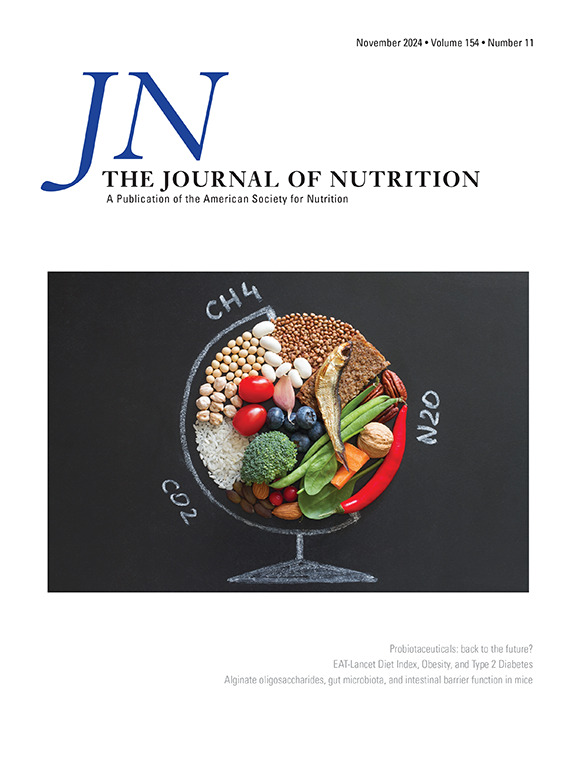Extracellular Vesicles From Lactobacillus fermentum Enhance Intestinal Barrier Integrity and Restore Gut Microbial Homeostasis in Experimental Murine Colitis
IF 3.7
3区 医学
Q2 NUTRITION & DIETETICS
引用次数: 0
Abstract
Background
Lactobacillus fermentum has been shown to improve intestinal health and treat colitis; however, its precise efficacy and mechanisms in inflammatory bowel disease remain unclear.
Objectives
This study aimed to evaluate whether L fermentum and its metabolites, extracellular vesicles, and other components could modulate intestinal barrier function and gut microbiota to alleviate dextran sulfate sodium (DSS)-induced colitis in mice.
Methods
Forty-eight mice were randomly assigned to 6 groups: control, DSS, L fermentum+DSS group (LF+DSS), heat-inactivated L fermentum+DSS group (LHF+DSS), L fermentum supernatant solution+DSS group (LSF+DSS), and L fermentum extracellular vesicles+DSS group (LEV+DSS). After a 1-wk acclimation, mice were gavaged daily for 3 wk. Fresh cultures, including live (LF+DSS), heat-inactivated (LHF+DSS), supernatant (LSF+DSS), and extracellular vesicles (LEV+DSS), were prepared daily. During the final 7 d, the control group received normal water, and the other groups received 3% DSS. Data were collected daily, followed by sample collection from the mice.
Results
In this study, significant reductions (P < 0.05) in body weight changes, disease activity index, intestinal damage, and histology scores were observed in the treatment groups, especially LEV+DSS and LF+DSS. Additionally, compared with the DSS group, colonic mucus secretion, as well as claudin-1 and occludin expression, increased significantly (P < 0.05) in the LEV+DSS and LF+DSS groups, whereas proinflammatory cytokines IL-1β and TNF-α decreased (P < 0.05) and IL-10 increased (P < 0.05) in the LEV+DSS group. L fermentum and its components significantly regulated gut microbiota α-diversity and β-diversity, affecting overall composition. Linear discriminant analysis effect size analysis revealed an enrichment of beneficial bacteria including Prevotellaceae_UCG-001, Romboutsia, and Ruminococcus species in the LF+DSS group and Akkermansia, Odoribacter, and Marvinbryantia species in the LEV+DSS group. Both L fermentum and its extracellular vesicles significantly downregulated the gene expression of TNF-α and IL-1β, whereas the expression of IL-10 was upregulated, thereby contributing to the alleviation of colitis symptoms.
Conclusions
This study reveals that L fermentum alleviates colitis through modulation of the gut microbiota and reinforcement of the intestinal mucosal barrier, with its extracellular vesicles potentially playing a key role in this regulatory process.
实验小鼠结肠炎中发酵乳杆菌细胞外囊泡增强肠道屏障完整性,恢复肠道微生物稳态。
背景:发酵乳杆菌(L. fermentum)已被证明可以改善肠道健康和治疗结肠炎;然而,其在炎症性肠病(IBD)中的确切疗效和机制尚不清楚。目的:本研究旨在评估发酵乳杆菌及其代谢产物、细胞外囊泡等成分是否能调节肠道屏障功能和肠道微生物群,以减轻葡聚糖硫酸钠(DSS)诱导的小鼠结肠炎。方法:48只小鼠随机分为6组:对照组(CON)、DSS组、乳酸菌发酵乳+ DSS组(LF + DSS)、热灭活乳酸菌发酵乳+ DSS组(LHF + DSS)、乳酸菌发酵乳上清液+ DSS组(LSF + DSS)、乳酸菌发酵乳胞外囊泡+ DSS组(LEV + DSS)。经过一周的驯化后,小鼠连续三周每天灌胃。每天制备新鲜培养物,包括活培养物(LF + DSS)、热灭活培养物(LHF + DSS)、上清(LSF + DSS)和细胞外囊泡(LEV + DSS)。最后7天,对照组给予正常水,其余组给予3% DSS。每天收集数据,然后从小鼠身上收集样本。结果:各治疗组患者体重变化、疾病活动指数(DAI)、肠道损伤、组织学评分均显著降低(P < 0.05),以LEV + DSS、LF + DSS效果显著。此外,与DSS组相比,LEV + DSS组和LF + DSS组结肠粘液分泌、claudin-1和occludin表达均显著升高(P < 0.05),促炎因子白细胞介素(IL) -1β和肿瘤坏死因子-α (TNF-α)降低(P < 0.05), IL-10升高(P < 0.05)。发酵乳杆菌及其组分显著调节肠道菌群α-多样性和β-多样性,影响整体组成。LEfSe分析显示,LF + DSS组的有益菌包括Prevotellaceae_UCG-001、Romboutsia和Ruminococcus, LEV + DSS组的有益菌包括Akkermansia、Odoribacter和Marvinbryantia。发酵乳杆菌及其胞外囊泡均可显著下调TNF-α和IL-1β基因表达,上调IL-10基因表达,从而减轻结肠炎症状。结论:本研究表明,发酵乳杆菌通过调节肠道菌群和加强肠粘膜屏障来缓解结肠炎,其细胞外囊泡可能在这一调节过程中发挥关键作用。
本文章由计算机程序翻译,如有差异,请以英文原文为准。
求助全文
约1分钟内获得全文
求助全文
来源期刊

Journal of Nutrition
医学-营养学
CiteScore
7.60
自引率
4.80%
发文量
260
审稿时长
39 days
期刊介绍:
The Journal of Nutrition (JN/J Nutr) publishes peer-reviewed original research papers covering all aspects of experimental nutrition in humans and other animal species; special articles such as reviews and biographies of prominent nutrition scientists; and issues, opinions, and commentaries on controversial issues in nutrition. Supplements are frequently published to provide extended discussion of topics of special interest.
 求助内容:
求助内容: 应助结果提醒方式:
应助结果提醒方式:


